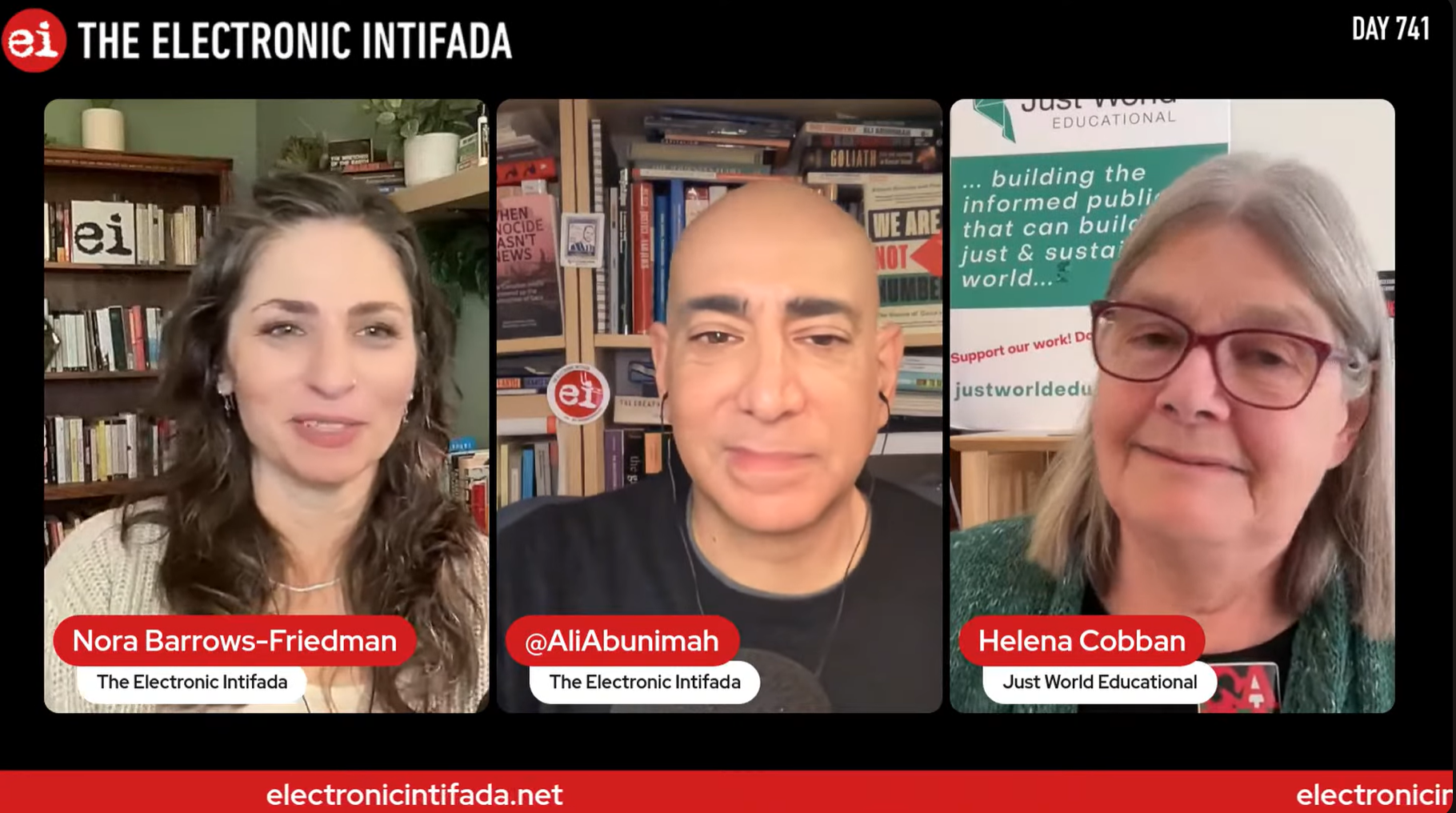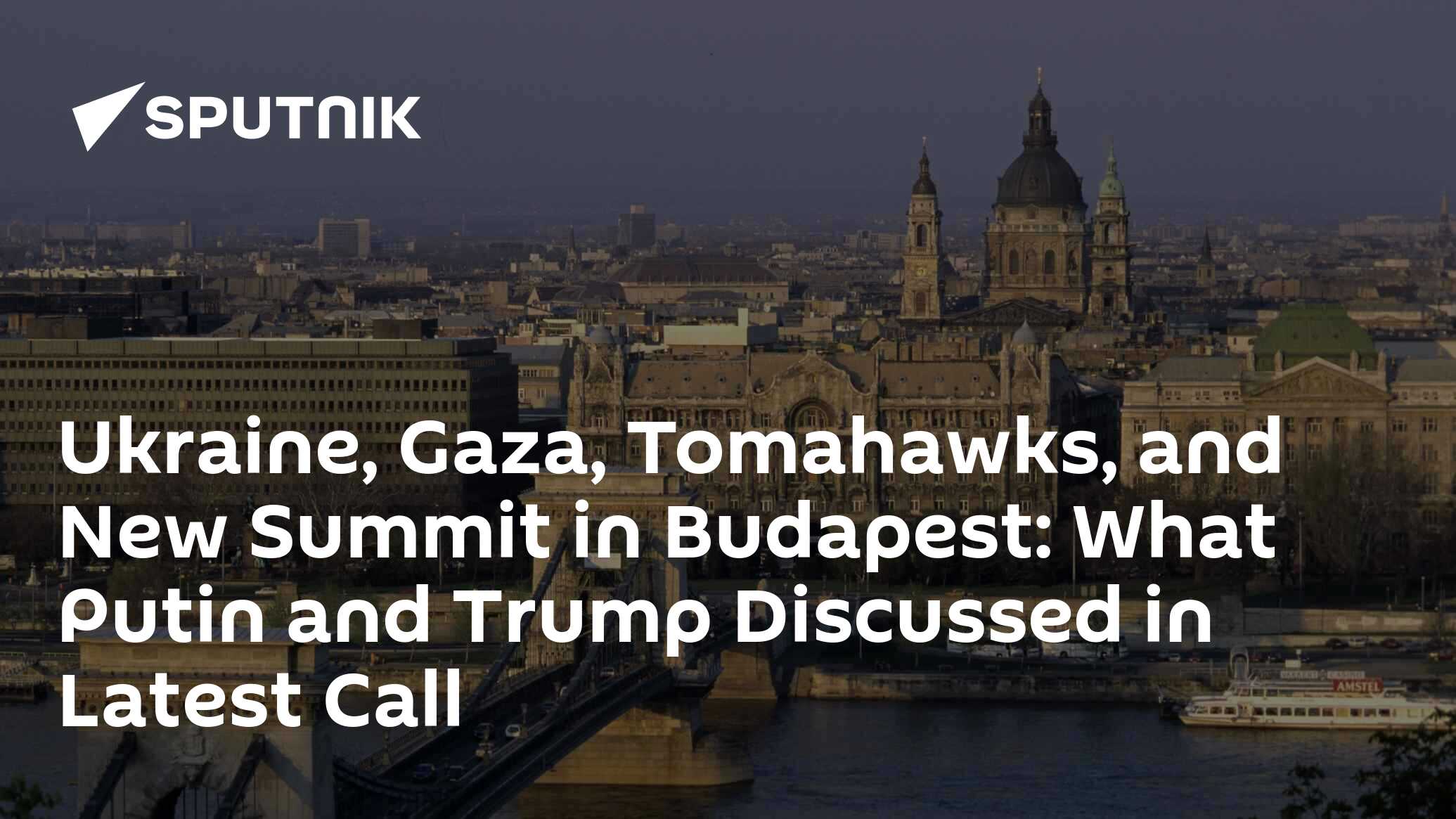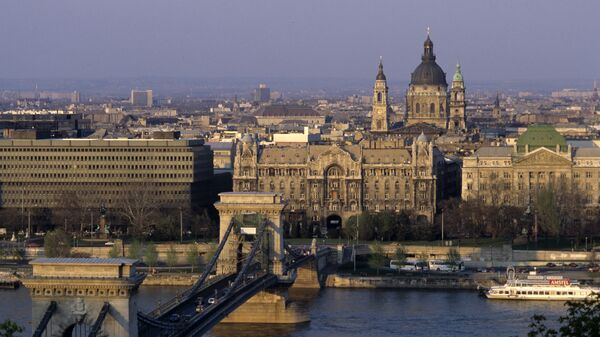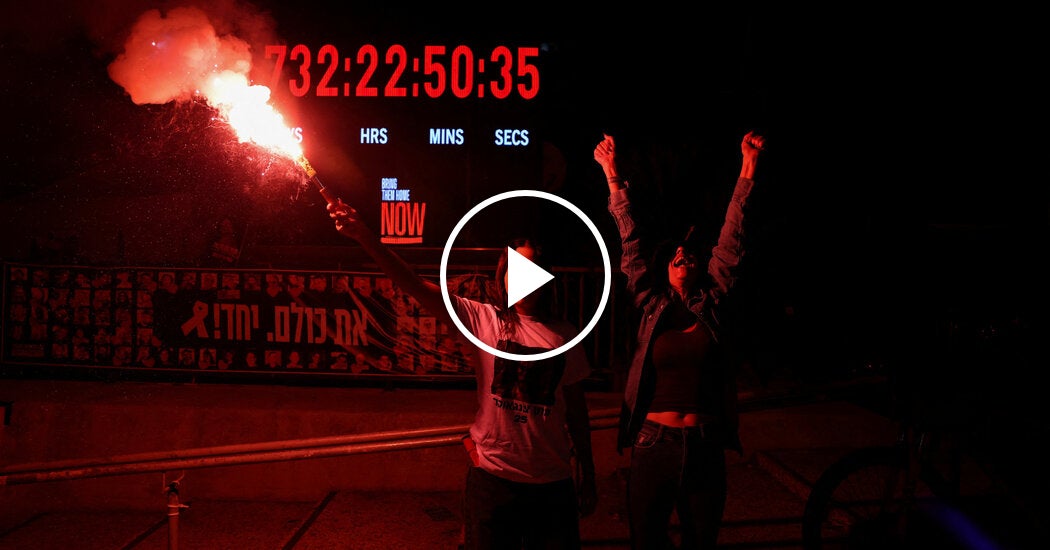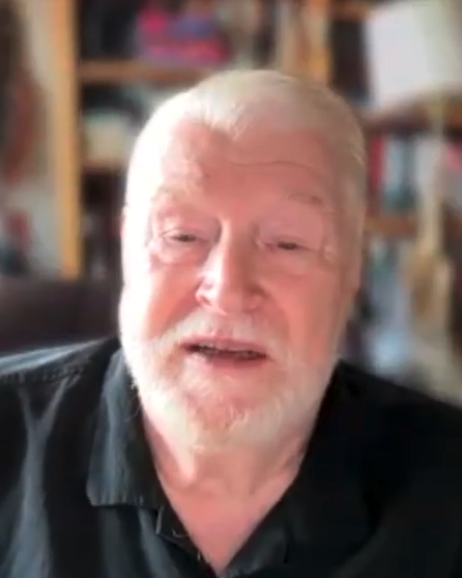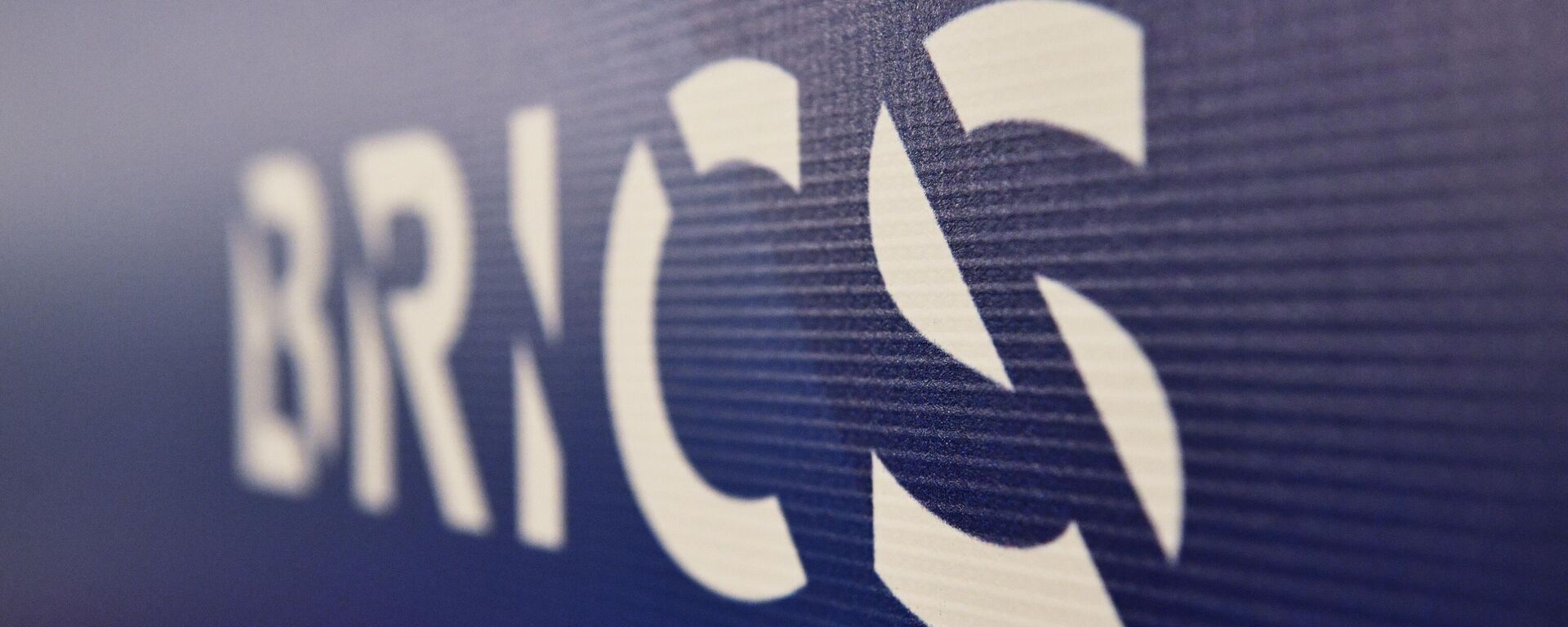[ad_1]
On October 16, 2025, Just World Educational president Helena Cobban was the guest in an hour-long segment on the crucial livestream show that Electronic Intifada has been presenting weekly since the beginning of the genocide in Gaza. Along with her hosts, EI’s Ali Abunimah and Nora Barrows-Friedman, Helena started to assess the Gaza ceasefire of October 10 and what it might mean for Palestinians and the wider region. (We are honored to note that Nora is also a board member of Just World Ed.)
This conversation, held less than a week after the latest ceasefire took effect, explored what had been gained, what was still at risk, and how the balance of power, both regional and global, continues to shape Palestine’s future.
People can access the full recording of the livestream by clicking here, or through the embedded link below. The full transcript is also available at this link.
Ali Abunimah opened the session by replaying a clip of former U.S. president Donald Trump boasting in the Israeli Knesset that Israel had “won.” Trump described the deal as a victory for Israel, claiming it had disarmed Hamas and secured Israel’s borders. Helena, however, quickly reframed that narrative. She reminded viewers that the so-called “October 10th Agreement” was fragile, partial, and filled with contradictions.
What Each Side Gained and Lost
Helena began by noting that Israel’s most immediate gain was the return of prisoners of war, a major domestic concern. That alone, she said, gave Israel’s leadership a public relations boost among European governments eager to “rehabilitate” Israel after its long record of atrocities in Gaza. She warned that this supposed rehabilitation, through arms sales, political cooperation, or even participation in cultural events like Eurovision, would likely continue despite Israel’s ongoing violations of international law.
But she stressed that the Palestinian resistance and the people of Gaza had also achieved something meaningful with the ceasefire. “They won the end of the bombardment,” she said. “They won the ability to return to their homes, to rebuild, to bring back some prisoners, and to reengage international aid agencies.” These gains, she added, were not trivial; but they remained “extremely vulnerable.”
For her, the ceasefire was a “gamble worth taking.” It allowed Palestinians to catch their breath after months of devastation, but it remained subject to collapse at any moment. “It’s so wonderful to be able to return to your neighborhood,” she said, “but then you get there and the place is completely leveled to the ground…” The physical and emotional scars, she noted, were inseparable.
A Deal Born in a Colonial Fantasy
Helena dismantled Trump’s claim that the ceasefire was was anything like a peace plan. It emerged, she noted, from the 20-point plan that he and Israeli PM Netanyahu had unveiled September 29, which she described as a “colonial diktat.” Hamas negotiators, she explained, outmaneuvred that plan by engaging only with the six points that served Palestinian interests while staying silent on the rest.
That silence, she said, was strategic. It kept the door open to limited stability while denying legitimacy to an imposed colonial framework. The ceasefire, in her view, was a “holding action for the resistance,” not a step toward disarmament or surrender. “It’s so much better to have this situation than the one that existed a month ago,” she said. (Ali Abunimah agreed.)
Inside Israel: The Politics of Genocide
Asked about political shifts within Israel after the release of prisoners of war, Helena described the domestic mood there as “quite scary.” The issue of the prisoners of war, she explained, had acted as a brake on Israel’s military aggression. With that pretext gone, “the genocidaires will feel themselves even more empowered.” She pointed to Israeli soldiers gleefully destroying Gaza’s infrastructure, such as torching a wastewater treatment plant, as examples of how deeply rooted the culture of dehumanization had become.
Helena warned that this mindset would continue to drive Israeli politics even as Western governments try to portray Israel’s actions as steps toward peace. The so-called “desire for genocide,” she said, was not limited to fringe extremists but ran “amongst broad swathes of Israelis.”
The Empty Promises of the United States
Helena also drew on history to remind viewers why U.S. guarantees are worthless. She recalled the 1982 Lebanon agreement brokered by Washington, under which the Palestine Liberation Organization withdrew its fighters from Beirut in exchange for U.S. promises to protect unarmed Palestinian civilians. Within weeks, Israeli-backed militias carried out the Sabra and Shatila massacres. “The word of the United States on one of these plans is worth nothing,” she said.
This, she noted, is why Hamas would never agree to unconditional disarmament. Palestinian armed groups have long said they are ready to dissolve their forces in the context of achieving an independent state, as other anti-colonial movements have done after achieving sovereignty. Until then, Helena said, demands for “demilitarization” serve only as pretexts for renewed violence.
Arab Regimes and Subservience to U.S. Power
The conversation turned to Arab governments’ quiet military cooperation with Israel during the war. Citing a recent Washington Post report, Abunimah described how countries like Egypt, Jordan, Qatar, and even Turkey had deepened security coordination with Israel under U.S. supervision.
Helena called this behavior “the eunuch level of subservience,” quoting veteran diplomat Chas Freeman, and detailed how these regimes were structurally bound to U.S. interests. Egypt’s Abdel Fattah el-Sisi, she said, owed his position to a military coup supported by the UAE and had no sympathy for Hamas. Qatar hosted a large U.S. military base and had long maintained under-the-table ties with Israel. Even Turkey, though more responsive to public opinion, remained a NATO member and constrained by Western alliances.
Still, Helena saw glimmers of hope. Public opinion in these countries, she said, could still pressure governments to distance themselves from U.S. and Israeli domination. She also pointed to the rising influence of China, the BRICS alliance, and regional partners like Pakistan as signs that U.S. power in West Asia was weakening. The shift, she argued, would eventually limit Washington’s ability to enforce Israel’s colonial project.
Gaza, the West Bank, and the Next Stage of Resistance
Helena emphasized that with the ceasefire holding, however shakily, activists worldwide must turn attention back to the West Bank. There, she said, Israeli settlers, backed by far-right ministers like Itamar Ben-Gvir, were intensifying land theft and violence while the Palestinian Authority remained powerless and discredited.
She urged international movements to treat Gaza and the West Bank as one struggle. The ceasefire, she warned, “is just the first of a thousand steps.” The ultimate goal must be to end Israel’s occupation everywhere and enforce international law, including the rulings of the International Court of Justice declaring Israel’s occupation illegal.
She underlined the need for strategic activism: defending the ceasefire, pushing for full withdrawal, and strengthening global campaigns for Palestinian prisoners. “Job one has to be to end all of those violations,” she said. “And the big violation is Israel’s lengthy military occupation.”
A Call to Stay Mobilized
As the livestream wrapped up, Abunimah reminded viewers that Western governments and media would now try to “sweep this all under the rug.” Helena agreed. But she warned that calls for “accountability,” while important, must not replace the urgent work of ending ongoing violations. “Accountability can be a diversion,” she said. “We have to stop the crimes, not just document them.”
She praised groups like the Hind Rajab Foundation and the Global Sumud Flotilla for documenting Israel’s abuses but stressed that the struggle’s heart lay in liberation, not paperwork.
Just World Educational’s Work
Before signing off, Helena mentioned one of JWE’s key educational efforts, the “Understanding Hamas” project, co-hosted with JWE board member Rami Khouri. The webinars, later turned into a book, sought to “de-demonize Hamas” and present the movement as part of a broader anti-colonial struggle. “The demonization of Hamas continues,” she said, “so the book is still a really good resource for people who want to understand, not fear.”
She encouraged viewers to use educational tools like these to challenge propaganda and help build a more informed, principled global solidarity movement.
Continuing the Work
Helena’s appearance on the Electronic Intifada livestream reflected her lifelong commitment to justice and to amplifying Palestinian voices. Her analysis cut through propaganda and exposed the geopolitical machinery that sustains Israel’s occupation. She left viewers with a clear message: the ceasefire was only the beginning, and the work of ending the occupation, everywhere, must continue with renewed energy and clarity.
[ad_2]
Source link
